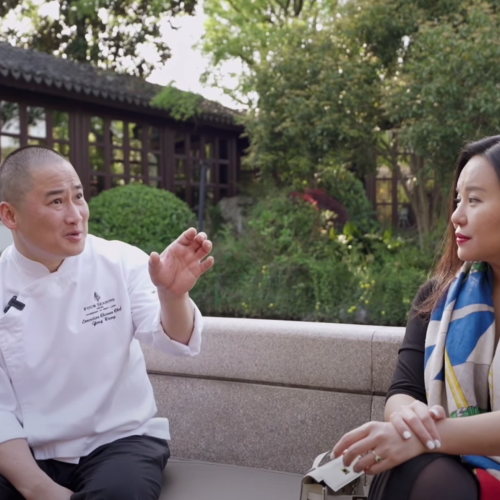Author: Jocelyn Chen
The original article was published in the “Economic Daily News of Taiwan” on 30 January 2020

Founder of Xin Rong Ji, Zhang Yong
If there is a new emperor of Chinese cuisine in China, no one deserves the title more than Xin Rong Ji, a restaurant just awarded three stars by the Micheline Guide Beijing. Its founder, Zhang Yong, started the business 20 years ago in Linhai (a city in Taizhou, Zhejiang Province) and now owns more than 30 restaurants. With his focus on good ingredients rather than flashy displays of techniques, he created a landmark in the Chinese food industry by breaking the dominance of Cantonese cooking.
Xin Rong Ji’s unique menu is built around wild-caught seafood, including wild yellow croaker from the East China Sea and fish maw. One of its locations in Beijing received three Michelin stars last year, making it the only brand of Chinese cuisine in mainland China to be given such rating by the prestigious guide. As a group, Xin Rong Ji has 9 stars under its belt, an impressive achievement rare on a global scale.

Home-cooked yellow croaker
Since it opened in 1995, Xin Rong Ji has acquired a reputation far and wide. It set up a branch in Hong Kong in 2018, which has earned it even more attention. Over the past couple of years, I’ve been a frequent guest at the restaurant’s locations in Shanghai. This time I spent more than three hours on an HSR train from Shanghai to Taizhou in order to visit the original Xin Rong Ji at the invitation of Agnes Chee, a Hong Kong-based gourmet.
Before dinner we viewed Zhang Yong’s personal art collection. Designed by Jaya Ibrahim, an interior designer renowned for his work with Aman Resorts, the setting for the display resembled a small museum. When we saw ores in his collection, Zhang explained that they were taken from a mine he had invested in, to remind him how the investment project was unsuccessful because of his lack of knowledge about the mining industry.

Zhang Yong’s personal art collection
The name of Xin Rong Ji symbolizes flourishing and the pursuit of the true flavor of food. The meanings were embodied in the dishes we tasted: breakfast made from Taizhou specialties, home-cooked yellow croaker with handmade and just-out-of-the-steamer Taizhou rice cake. I was especially impressed with the sweetness of the seasonal white radish.
Many people may not be familiar with Taizhou cuisine which is rarely mentioned when we talk about the traditional eight major regional categories of Chinese cuisine. In fact Taizhou is blessed with four distinct seasons and abundant produce. In keeping with the local cooking’s emphasis on seasonality, Xin Rong Ji serves food made from the freshest seasonal ingredients: a wide variety of vegetables and seafood in spring, mushrooms in summer, crabs in autumn and lamb in winter.

Organic farm of Xin Rong Ji
Fresh ingredients need only simple cooking to bring out their best taste. Common cooking techniques employed in the local cuisine are similar to those in Fujian cooking, though with delightful variations. For example seafood is often steamed, but you can also find pan-fried, braised, deep-fried and stir-fried dishes. Sitting at the intersection of Ningbo cuisine (with a focus on umami taste brought out by saltiness) and Wenzhou cuisine (with a preference for steamed food), Taizhou cuisine is characterized by intense but not overpowering flavor and would satisfy more people’s palate, said Zhang.
I was impressed with my visit to Taizhou during which I learnt that Xin Rong Ji has built its own supply chains for all food ingredients from fruit and vegetables to seafood. We visited its organic farm which applies circular economy principles. Its seafood supplier is big enough to have surpluses to provide to other buyers. The restaurant’s self-sufficient supplies of ingredients include more than seafood and fruit and vegetables: even its tofu is made in house. With such dedication to sourcing good ingredients and with its respect for the original taste of food, Xin Rong Ji lives up to its mission statement of “being true to the genuine taste of food before you can bring it to perfection”. It is also the first farm-to-table restaurant of haute Chinese cuisine in China.

Xin Rong Ji has built its own supply chains for all food ingredients
Zhang is rather cautious about the idea of having a central kitchen. Each of the 31 stores owned by the group Xin Rong Ji prepares food in its own kitchen. Like Din Tai Fung, Xin Rong Ji stresses a high level of standardization and a clear division of labor. Yet unlike Din Tai Fung, Xin Rong Ji offers food more on the side of fine dining, which is harder to standardize.
Xin Rong Ji in Beijing is among the less-than-10 restaurants that received three Michelin stars within less than one year since opening. Somebody in the industry might say the guide was being politically correct in choosing the Beijing store to be its three-star recipient. However if Michelin had to give a three-star to a Chinese restaurant in the capital city, it made a clever decision since Xin Rong Ji would be the least controversial choice. In addition to its attention to ingredients, Xin Rong Ji stands out in China’s food scene with a cooking philosophy in line with the current trend of culinary minimalism, without losing any refined elegance. I went there once with the Italian three-star chef Niko Romito. He praised the restaurant highly and kept asking about the details of the dishes.

When Michelin announced its decision the Xin Rong Ji team—including the founder Zhang Yong—all burst into tears. In a post shared on his social media page, Zhang wrote that he was surprised and humbled by the honor. Comparing himself to be a chicken always dreaming to be a phoenix, he said that the chicken was at a loss when suddenly the feathers of a phoenix were put on it; it will always remain a humble chicken, but it can never do without such dreams and aspirations.
Zhang is a man of vision. He began his professional career in finance but decided to dive into the business of food simply because of his love for food. What started off as a food stall has worked its way up the culinary ladder to be a brand of fine dining, with establishments in Hangzhou, Shanghai, Beijing, Hong Kong, and Shenzhen.

The original Xin Rong Ji in Linhai
Zhang is not a stereotypical businessman; he is a genuine and polite man who has an eye for details and a preference for keeping a low profile. He loves good food and is a good cook at home. He wept tears of joy with his team when the good news came out, showing that he was probably as much involved as the chefs at the helm of his kitchens—although some say Xin Rong Ji’s standardization is so successful that it doesn’t put a lot of spotlight on its chefs.
His demand for genuineness entails more than respect for food ingredients. He takes food safety very seriously and in his business group there is a dedicated food safety inspection team of ten people who produce testing reports every week. The group takes an integrated and scrupulous approach to food safety management from farm to fork. Meanwhile it has established a school in Linhai to train waiters and waitresses for its 31 stores across China, which have hired more than 3000 employees and require a lot of manpower. For each class the school recruits around 200 people from educational institutes all over the country to ensure there will be no shortage of human resources.
Genuineness – the brand DNA of Xin Rong Ji – also shines through in its relationship with employees. It is like one big family with many people working there for more than 10 years.

The restaurant has not ventured overseas, but in a country of great diversity like China, where customs and habits in each province vary widely, the challenges for it to overcome are no less than for multinational enterprises.
I believe the best way to cook fresh, first-class ingredients is not to overcook them. This is also Xin Rong Ji’s core value. As Zhang said, he adheres to the principle of unpretentiousness, as opposed to flamboyant displays of techniques. Indeed it is Xin Rong Ji’s meticulous attention to ingredients and its stable performance that has won the favor of Michelin judges.
If Zhang were the chef of Xin Rong Ji, the nine stars it has received would have put him among the top ten Michelin-starred chefs in the world. Across the globe, only Joël Robuchon, Alain Ducasse, Gordon Ramsay, Martín Berasategui, and Pierre Gagnaire run restaurants that collectively hold 10 or more stars. Yet if one thinks about this from another perspective, Xin Rong Ji—ranked number six globally by the number of stars—is already a record-breaker in the field of Chinese cuisine. Moreover a Michelin star is never awarded to the chef; it goes to the restaurant and thus all the heroes and heroines behind it.

After years of development, the model of Xin Rong Ji is very similar to that of Joël Robuchon’s restaurants. Both features replicable design and menu that would make it easy for the restaurant empire to expand, a top-flight core team, and a high level of consistency. It’s a pity that the late Robuchon – the most Michelin-decorated chef in the world – didn’t get a chance to try Xin Rong Ji’s food during his only handful of visits to mainland China. Otherwise the celebrated chef would have spoken highly of it.
If one day Xin Rong Ji starts to make plans to enter overseas markets, it will change global food lovers’ view on Chinese cuisine. They will realize that Chinese cooking is on a new path toward simple beauty and respect for nature and that Cantonese cuisine no longer outshines the other regional ones.
When I asked Zhang if he had other dreams in life, he said his dream was to do what he has been doing and then do it again.
 Jocelyn Chen
Jocelyn Chen
Jocelyn Chen has received Master degree of SDA Bocconi Business School in Milan, Italy. She is the founder of fine dining media tastytrip.com She also acts as judge for many renown food competitions and awards. She was one of the judges of “Chef Nic”, the popular cooking show in China and the moderator of chef documentary “Banquet Planet”. Columnist of Taiwan Economic Daily News and several lifestyle magazines in China. All articles are published on tastytrip.com.
Jocelyn’s Instagram:jocelyn_tastytrip











